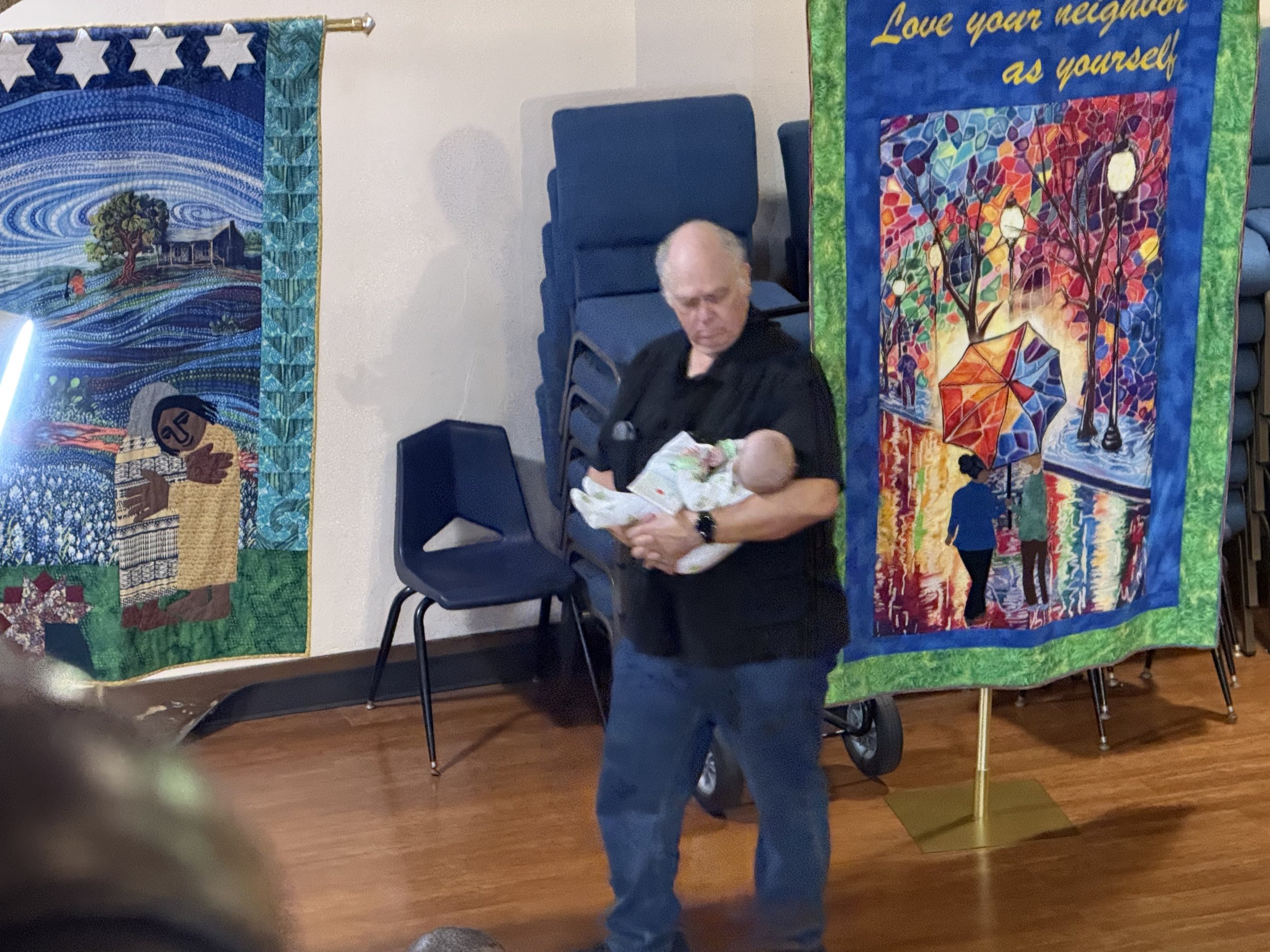Sacred Sounds: Why babies belong in worship
Lawrence Philbrook and baby. Photos: Gerald Farinas.
There’s something profoundly beautiful about the scene captured at Edgewater Presbyterian Church today. Lawrence Philbrook—father of our vocalist Lela—with weathered hands gentle and sure, cradling a fussing infant while Rev. Kristin Hutson’s sermon continues in the background.
Behind Larry and baby, vibrant quilted banners proclaim “Love your neighbor as yourself,” creating a tapestry of faith that spans generations.
This moment tells a story that every worshipping community needs to hear.
Babies don’t just belong in worship; they are essential to it.
The symphony of sacred sounds
When a baby cries during the reading of Scripture or coos during the pastoral prayer, some well-meaning congregants might wince.
But perhaps we’ve forgotten that worship was never meant to be a performance requiring perfect silence.
The sanctuary is not a concert hall where disruption ruins the experience. It’s a family gathering where the full spectrum of human life unfolds before God.
The Psalmist understood this when writing, “Out of the mouths of infants and nursing babies you have prepared praise” (Psalm 8:2, NRSV Updated Edition).
Those tiny voices, whether crying from hunger or babbling with wonder, are offering their own form of praise. Their sounds remind us that worship is not about achieving human standards of decorum, but about gathering as we are. We are messy, needy, and beautifully human.
Learning the language of love
When we welcome babies into our worship spaces, we teach profound lessons that no curriculum could provide.
Children learn that they belong in the community of faith not when they’re old enough to sit still, but simply because they exist.
They absorb the rhythms of prayer, the cadence of Scripture, and the melodies of hymns long before they understand their meaning.
More importantly, the entire congregation learns what it means to embody Jesus’s radical welcome.
When Christ said, “Let the children come to me, and do not hinder them, for to such belongs the kingdom of heaven” (Matthew 19:14, NRSV Updated Edition), he wasn’t suggesting they wait until they could behave appropriately.
He was declaring that the kingdom of God is revealed through the very qualities that make children seem disruptive to adult sensibilities—their immediacy, their honesty, their lack of pretense.
The gift of interruption
That crying baby isn’t disrupting worship. They’re completing it.
Their needs remind us that we gather not as isolated individuals seeking personal spiritual experience, but as a body called to care for one another.
When that elder at the Edgewater Kirk rose to comfort the child, he wasn’t managing a problem; he was demonstrating the Gospel.
These interruptions teach us about the nature of God’s love, which doesn’t wait for convenient moments or proper behavior.
They remind us that faith is lived out in the midst of ordinary needs: hunger, tiredness, the simple desire to be held.
When a parent rocks a fussing infant during Communion, they’re participating in the mystery of incarnation, the truth that God enters our most human moments.
Building bridges across generations
The image of weathered hands holding new life speaks to something essential about Christian community.
Faith is not meant to be segregated by age, with children shuttled away until they’re “ready” for real worship.
The beauty of intergenerational worship lies in its honest portrayal of life’s full arc—the wisdom of years meeting the wonder of new beginnings.
Young families need to see that they’re supported, that their struggles are shared burdens, and that their children are treasured members of the community.
Older members need the reminder that faith is always being born anew, that the Gospel story continues in fresh voices, even if those voices sometimes wail during the offertory.
Practical grace
This doesn’t mean worship becomes chaos or that parents shouldn’t be thoughtful about their children’s needs.
It means we create spaces where families can participate fully without fear of judgment.
It means having quiet rooms with windows where parents can tend to babies while remaining part of the service.
It means elders like Larry who naturally reach for crying children and ushers who smile instead of frown when a toddler escapes down the aisle.
Most importantly, it means remembering that the goal of worship is not perfect execution but authentic encounter, with God and with one another in all our beautiful imperfection.
The kingdom sounds like this
The kingdom of heaven, it turns out, sounds like a nursery sometimes. It sounds like the gentle shushing of a grandfather’s voice, the rustle of parents reaching into diaper bags, the sudden delighted squeal of a baby who’s spotted the light streaming through stained glass windows. It sounds like a community that values presence over perfection, relationship over rules.
In that moment at the Edgewater Kirk, with its backdrop of quilted love and intergenerational care, we see worship as it was meant to be—not a pristine performance, but a family gathering where everyone belongs, everyone is held, and everyone has something to offer, even if they can’t yet speak the words.
The next time you hear a baby’s voice rising during the sermon, don’t think disruption. Think completion.
Think of the Psalmist’s words about praise from the mouths of infants.
Think of Jesus’s arms open wide to welcome the very young.
Think of Larry’s gentle hands and a community learning what it truly means to love our neighbors as ourselves.
After all, the most important lessons about faith aren’t taught in Sunday school classrooms. They’re lived out in moments like these, when the whole body of Christ gathers and discovers that the kingdom of heaven sounds exactly like home.

